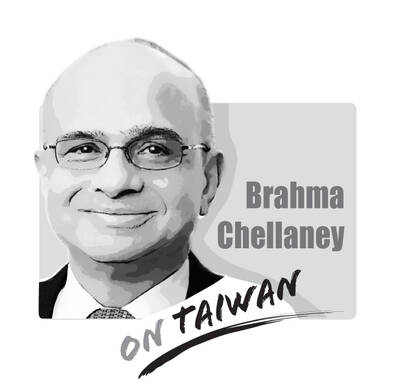The government’s efforts to boost domestic demand will be meaningless if unemployment continues to rise and wages continue to fall.
According to the latest unemployment and wages data released last week by the Directorate-General of Budget, Accounting and Statistics (DGBAS), the jobless rate hit a modern-era record of 5.82 percent last month, with the number of unemployed rising by 8,000 from the previous month to 633,000.
The average monthly income, meanwhile, dropped by a record 8.54 percent year-on-year to NT$47,107 during the first four months of the year. That figure is the lowest since 2003 and represents an income reduction of NT$4,399 per month per person.
The average monthly income includes regular wages, overtime and bonuses. Without overtime and bonuses, the average regular wage fell by a record 3.04 percent to NT$35,488 in the first four months, a cut of NT$1,031 per month per employee from a year earlier, according to the DGBAS data.
Taiwan is among the hardest-hit export-oriented nations in the Asia-Pacific region. To revive the economy, the government has budgeted NT$149.16 billion in stimulus spending this year to create between 190,000 and 220,000 jobs. This figure does not include the NT$85.7 billion consumer voucher program that was rolled out earlier this year, though it was hoped that this program could also boost consumer spending and keep the economy humming.
Economists are now predicting that the economy will move into positive territory in the fourth quarter — in short, they are saying the worst is over. However, for wage earners, job security remains the biggest concern as the global economic downturn continues. Tightfistedness has become a priority as households cope with declining incomes.
Taiwan already enjoys a considerably high savings rate of about 30 percent, based on the most recent data compiled by DGBAS.
But since welfare mechanisms for the unemployed are weaker than in most other developed countries, wage earners have developed a tendency to put aside more money in preparation for bad times.
Such caution in discretionary spending is creating an unheralded counter-balance to the government’s stimulus plans, and this phenomenon will drag the economy down further rather than boost demand. John Maynard Keynes’ theory of “paradox of thrift” states that the more money consumers save, the less demand exists and the more damage is inflicted on the economy — especially during a slowdown.
This paradox can partially explain why the nation’s domestic economy — including the retail, wholesale and restaurant sectors — dropped 12.25 percent year-on-year to NT$4.8 trillion in the first five months of the year, despite the government’s fiscal stimulus measures to kick-start spending.
Interestingly, and ironically, the savings paradox frowns on the conventional wisdom that thrift is virtuous. For individuals, there is nothing wrong with frugality during an economic downturn; such people don’t have to change their behavior very much to adjust to hard times. But for the government, this situation only validates public concerns about the inadequacy of social welfare networks, and there are implications flowing from this on the effectiveness of fiscal stimulus efforts.
If the government proceeds with more spending as part of its stimulus programs, policymakers should be mindful of the consequences of neglecting job security and falling wages. Otherwise it could find that its efforts to revive the economy will be futile — together with the attendant political risk.
Taiwan’s victory in the World Baseball Softball Confederation Premier12 championship is an historic achievement. Yet once again this achievement is marred by the indignity of the imposed moniker “Chinese Taipei.” The absurdity is compounded by the fact that none of the players are even from Taipei, and some, such as Paiwan catcher Giljegiljaw Kungkuan, are not even ethnically Chinese. The issue garnered attention around the Paris Olympics, yet fell off the agenda as Olympic memories retreated. “Chinese Taipei” persists, and the baseball championship serves as a reminder that fighting “Chinese Taipei” must be a continuous campaign, not merely resurfacing around international
Taiwan Semiconductor Manufacturing Co (TSMC) appears to be encountering some culture shock and safety issues at its new fab in Arizona. On Nov. 7, Arizona state authorities cited TSMC for worker safety violations, fining the company US$16,131, after a man died in May. The Arizona Division of Occupational Safety and Health released its six-month investigation into the fatality and cited TSMC for failing to keep the workplace free from hazards likely to cause death or serious harm. At about the same time, the chip giant was also sued for alleged discriminatory hiring practices favoring Asians, prompting a flurry of debate on whether TSMC’s
This month, the National Health Insurance (NHI) is to implement a major policy change by eliminating the suspension-and-resumption mechanism for Taiwanese residing abroad. With more than 210,000 Taiwanese living overseas — many with greater financial means than those in Taiwan — this reform, catalyzed by a 2022 Constitutional Court ruling, underscores the importance of fairness, sustainability and shared responsibility in one of the world’s most admired public healthcare systems. Beyond legal obligations, expatriates have a compelling moral duty to contribute, recognizing their stake in a system that embodies the principle of health as a human right. The ruling declared the prior

US president-elect Donald Trump is inheriting from President Joe Biden a challenging situation for American policy in the Indo-Pacific region, with an expansionist China on the march and threatening to incorporate Taiwan, by force if necessary. US policy choices have become increasingly difficult, in part because Biden’s policy of engagement with China, including investing in personal diplomacy with President Xi Jinping (習近平), has not only yielded little but also allowed the Chinese military to gain a stronger footing in the South China Sea and the Taiwan Strait. In Xi’s Nov. 16 Lima meeting with a diminished Biden, the Chinese strongman signaled little